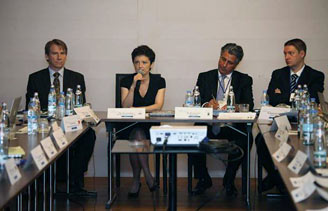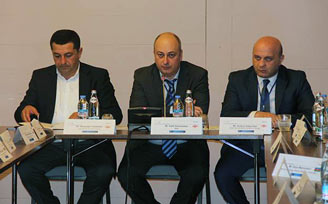Enhanced cyber defence cooperation in the South Caucasus and Black Sea region
Critical infrastructures and government services rely increasingly on Information Technology (IT) and this dependence has raised concerns about the vulnerability of such infrastructures to cyber threats. As cyber attacks become more prominent and conventionally used, new defence strategies, adaptive approaches and enhanced cooperation are required.

Recognising that infrastructure protection and responses to cyber incidents can serve to benefit all neighbours in the Black Sea and South Caucasus region, cyber defence experts and government representatives took part in a workshop in Tbilisi, Georgia from 29 June to 1 July to discuss options for increased cooperation.
The workshop, supported by NATO’s Science for Peace and Security (SPS) Programme, was led by co-directors from the Georgian Ministry of Justice’s Data Exchange Agency (DEA) and from Intellium Ltd, a cyber-security consulting company specialised in strategies for governments and critical infrastructures.

(From left to right) Welcome remarks by Mr William Lahue, Head of the NATO Liaison Office in Georgia; Ms Tea Tsulikiani, Minister of Justice of Georgia; Mr Michael Gaul, Senior Advisor, Emerging Security Challenges Division, NATO; and Andrea Rigoni, Managing ARW Project Co-Director and Managing Partner of Intellium.
More than 50 experts from countries including Armenia, Azerbaijan, Georgia, Hungary, the Republic of Moldova, Poland, Romania, Turkey and Ukraine participated. Representatives from international organisations such as ITU and the European External Action Service (EEAS), academia, industry, and leading research centres in Europe and the United States were also involved.
“Cyber threats in this region are often stemming from common sources and share many of the same characteristics, including method of attack. Accordingly, increased practical cooperation among our partners in the Black Sea and South Caucasus on cyber defence can only add to their national and collective security,” said Michael Gaul, Senior Advisor on Projects and Strategy in NATO’s Emerging Security Challenges Division.
The initiative aimed to improve regional cooperation by creating trust, information sharing and developing common cyber defence measures. The debate focused on cyber defence topics that require additional research and development, as well as cooperation between the public and private sector, and among nations. Discussions encompassed cyber defence strategies, capabilities and techniques; incident response and information sharing; international cooperation and potential regional cooperative approaches.
Towards increased cyber defence capabilities
As a result of this workshop, participants agreed on both the importance of a regional initiative to protect critical infrastructures, and the need for trainings and exercises for IT practitioners.

(From left to right) Alexander Tabatadze, Georgian Deputy Minister of Justice; Irakli Gvenetadze, Chairman of DEA of the Ministry of Justice of Georgia; Andrea Gotsiridze, Chairman of Cyber Security Bureau of Ministry of Defence of Georgia
Opening the channels of communication and increasing dialogue in this field could also provide the opportunity to collaborate on a common technical, legal, regulatory and interoperability framework in cyber defence.
"Georgia welcomes this high-level workshop, in participation with NATO and neighbouring countries – an event completely focused on cyber defence issues,” said Irakli Gvenetadze, Co-director of the SPS workshop and Chairman of the DEA at the Georgian Ministry of Justice.
As a way forward, the strategies developed through this regional initiative will allow the countries involved to increase their preparedness and capability to respond to cyber attacks.
